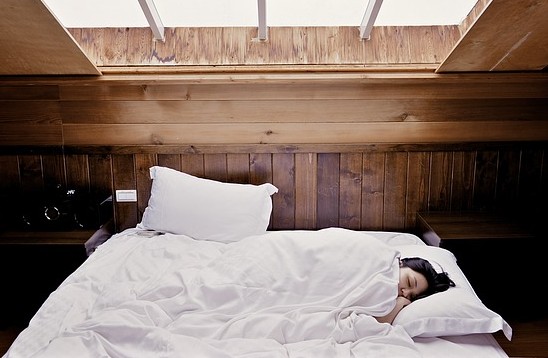How To Get A Better Nights Sleep
 Exercise. Vigorous exercise or even a small increase in exertion helps nocturnal sleep. Don’t exercise 5-6 hours before bedtime, as the body takes several hours to slow down.
Exercise. Vigorous exercise or even a small increase in exertion helps nocturnal sleep. Don’t exercise 5-6 hours before bedtime, as the body takes several hours to slow down.
Cut back on napping. “If you must nap, keep it brief & early in the day,” says Donald Bliwise, professor of neurology at Emory University School of Medicine. If you can’t resist dozing, keep it to 30 minutes or less.
Get 1-2 hours of daily sunlight exposure. If you are unable to fall asleep, get sun exposure in the morning. Those who fall asleep too early & want to reset their body clock should get sun exposure late in the afternoon. Natural light synchronizes the inner clock that regulates sleep, nudging the body into wakefulness by day & sleepiness at night. If you live where winter days are short, consider a bright lamp. Remember no light works as well as Mother Nature, even on an overcast day.
Sleep in darkness. If there is even the tiniest bit of light in the room it can disrupt your circadian rhythm & your pineal gland’s production of melatonin & seratonin.
Use night-lights. Exposing yourself to regular room light in the middle of the night can shift your internal sleep/wake clock, causing you to awaken early. Supplements. Melatonin, St John’s Wort or Valerian Root.
Set a sleep schedule. Go to bed at the same time each night. Set an alarm & get up at the same time each morning. “The brain’s sleep center wants a schedule,” says Leah Friedman, a sleep researcher at Stanford. Your body, particularly your adrenals, do most of their recharging from 11 pm to 1 am. Your gallbladder dumps toxins during this time. If you are awake the toxins back up into your liver, which then backs up into your entire system.
Ear plugs. Blocks out sleep disturbing sounds.
Wear socks to bed. Having the poorest circulation, the feet often feel cold before the rest of your body.
Take a hot bath 1-2 hours before bedtime. In addition to relaxing you, the cooling of your core body temperature after you leave the bath, promotes sleep. Don’t take your bath too close to the time you turn out the lights, because it takes the body an hour or two to cool down.
Puzzles. Crossword or Sudoku puzzles force you to focus, thus all the distracting thoughts go away & then you can sleep.
Listen to white noise or relaxation CDs. The sound of white noise or nature sounds, such as the ocean, can be soothing for sleep.
Avoid reading anything stimulating, (mystery or suspense novels), as they have the opposite effect. If you are enjoying a suspenseful book you might wind up unintentionally reading for hours instead of sleeping.
Keep a journal. If you often lie in bed with your mind racing, keep a journal. This is a great way to help you recover from the effects of stress.
Avoid TV before bed. Get the TV out of your bedroom. It stimulates your brain & it will take longer to fall asleep.
Avoid loud alarm clocks. It is stressful to awake suddenly.
Remove the clock from view. Constantly staring at it adds to angst.
Keep bedroom temperature less than 70 degrees. Turn down the heat 2 hours before you go to bed to give your bedroom time to cool off.
Big meals close to bedtime can lead to general discomfort and/or heartburn.
Avoid before-bed snacks, particularly grains & sugars. This will raise blood sugar & inhibit sleep. Later when blood sugar drops too low, you may wake up & not fall back asleep.
Eat a high-protein snack several hours before bed. This can provide the tryptophan needed to produce melatonin & serotonin.
Eat a piece of fruit. This can help the tryptophan cross your blood-brain barrier.
Avoid foods you are sensitive to. Especially dairy & wheat products, as they may have an effect on sleep, such as causing apnea, excess congestion, gastrointestinal upset & gas.
Don’t forget about Chiropractic. Many of our patients at Discover Chiropractic – Castro Valley find they sleep better when they are well adjusted! Call us at 510-247-1272 and see if we can help you.
